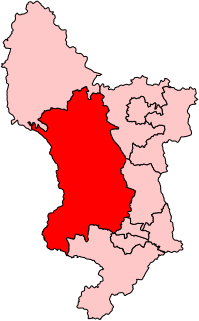
The Saskatchewan general election of 1938 was the ninth provincial election held in the Canadian province of Saskatchewan. It was held on June 8, 1938, to elect members of the Legislative Assembly of Saskatchewan.

Flinders is a single-member electoral district for the South Australian House of Assembly. It is named after explorer Matthew Flinders, who was responsible for charting most of the state's coastline. It is a 58,901 km² coastal rural electorate encompassing the Eyre Peninsula and the coast along the Nullarbor Plain, based in and around the city of Port Lincoln and contains the District Councils of Ceduna, Cleve, Elliston, Lower Eyre Peninsula, Streaky Bay and Wudinna; as well as the localities of Fowlers Bay, Nullarbor and Yalata in the Pastoral Unincorporated Area. The seat was expanded in 2002 to include a western strip of land all the way to the Western Australia border.
The East Norfolk by-election, 1939 was a parliamentary by-election held on 26 January 1939 for the British House of Commons constituency of East Norfolk.
The Monmouth by-election, 1945 was a by-election held for the British House of Commons constituency of Monmouth in Wales on 30 October 1945. The seat had become vacant on the death of the sitting Conservative Member of Parliament (MP) Leslie Pym, and the by-election was won by the Conservative candidate Peter Thorneycroft.
The Bridgwater by-election, 1938 was a parliamentary by-election for the British House of Commons constituency of Bridgwater, Somerset held on 17 November 1938.
The City of London by-election, 1938 was a by-election held on 6 April 1938 for the British House of Commons constituency of City of London, which covered the "Square Mile" which was the United Kingdom's traditional financial district.
The City of London by-election, 1940 was a by-election held on 5 February 1940 for the British House of Commons constituency of City of London, which covered the "Square Mile" which was the United Kingdom's traditional financial district.
The Oxford by-election, 1938 was a parliamentary by-election for the British House of Commons constituency of Oxford, held on 27 October 1938. The by-election was triggered when Robert Croft Bourne, the sitting Conservative Member of Parliament died on 7 August 1938. He had served as MP for the constituency since a 1924 by-election.

The 1938 United States elections were held on November 8, 1938, in the middle of Democratic President Franklin D. Roosevelt's second term. The Democratic Party lost 72 seats, mostly to the Republican Party, in the House of Representatives. The Democrats also lost seven seats to the Republicans in the U.S. Senate. This election marked the first time since the Civil War that the six-year itch phenomenon did not result in the president's party losing control of either house, as the Democrats still maintained majorities in both houses of Congress.
The Ipswich by-election of 1938 was held when the incumbent Conservative MP, Sir John Ganzoni, was elevated to the peerage.
The Willesden East by-election of 1938 was held on 28 July 1938. The by-election was held due to the death of the incumbent Conservative MP, Daniel Somerville. It was won by the Conservative candidate Samuel Hammersley.
The Stafford by-election of 1938 was held on 9 June 1938. The by-election was held due to the succession to the peerage of the incumbent Conservative MP, William Ormsby-Gore. It was won by the Conservative candidate Peter Thorneycroft.
The Dartford by-election of 1938 was held on 7 November 1938. The by-election was held due to the death of the incumbent Conservative MP, Frank Edward Clarke. It was won by the Labour candidate Jennie Adamson. Adamson afterwards stated that she won, because the voters "were ashamed of Mr. Chamberlain's betrayal of Czechoslovakia and of democracy."
The Fylde by-election of 1938 was held on 30 November 1938. The by-election was held due to the death of the incumbent Conservative MP, Edward Stanley. It was won by the Conservative candidate Claude Lancaster.
The Kinross and Western Perthshire by-election of 1938 was held on 21 December 1938. The by-election was held due to the resignation of the incumbent Unionist member of parliament Katharine Stewart-Murray, Duchess of Atholl, who resigned the Conservative and Unionist whip at Westminster as a protest against the National government's European policy, seeking re-election as an Independent. However, the seat was regained for the Unionists by William McNair Snadden.
The West Derbyshire by-election of 1944 was held on 17 February 1944. The byelection was held due to the resignation of the incumbent Conservative MP, Henry Hunloke. Hunloke was the brother-in-law of Edward Cavendish, 10th Duke of Devonshire, who had held the seat from 1923 until 1938, when he succeeded to his title and was replaced by Hunloke. The seat had been held previously by Hunloke's father-in-law, and by the 9th Duke's brother-in-law, the future 6th Marquess of Lansdowne (1908-1918).
The Fulham West by-election of 1938 was held on 6 April 1938. The by-election was held due to the death of the incumbent Conservative MP, Cyril Cobb. It was won by the Labour candidate Edith Summerskill.
Elections to Liverpool City Council were held on Thursday 1 November 1945. It was the first local election in which all those who qualified for a parliamentary vote could vote.
Elections to Liverpool City Council were held on 1 November 1938. One third of the council seats were up for election, the term of office of each councillor being three years.
Elections to Liverpool City Council were held on 1 November 1937. One third of the council seats were up for election, the term of office of each councillor being three years.




